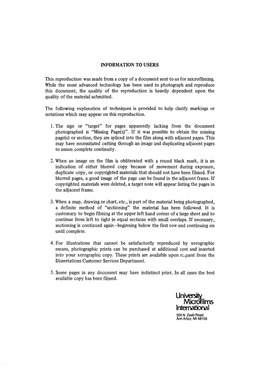| dc.contributor.author | Walker, Joseph Lamah, | en_US |
| dc.date.accessioned | 2013-08-16T12:28:49Z | |
| dc.date.available | 2013-08-16T12:28:49Z | |
| dc.date.issued | 1982 | en_US |
| dc.identifier.uri | https://hdl.handle.net/11244/5078 | |
| dc.description.abstract | There is a substantially large turnover of college and university presidents each year and a large number of these chief executive officers have only been in office four or fewer years at the time of their departure. The purpose of this study was to identify factors that distinguish differences between short and long tenured chief executive officers of state controlled universities with a student population of 9000 or more students. | en_US |
| dc.description.abstract | The conclusion of this present study suggests that the short tenured chief executive officer of a large state controlled university is a person less politically inclined, and thus, designated as being a-political. This conclusion was inferred from the data that yielded significant differences between short and long tenured past presidents. | en_US |
| dc.description.abstract | A questionnaire developed specifically for this research was completed by 230 of 291 possible subjects for a 79 percent return rate. | en_US |
| dc.description.abstract | The study revealed fourteen factors that reached statistical significance at a .10 level of confidence. As opposed to the longer tenured president, the short tenured president: (1) places a higher importance on board support for controversial decisions; (2) places a higher importance on the presence of an evaluation procedure; (3) spends more time with students; (4) is more likely to favor students' participation in the selection of faculty; and (5) student services personnel; (6) is more likely to favor students' input to graduation requirements; (7) places less importance on the prestige of a school in terms of satisfaction with the position of chief executive officer; (8) places a greater importance on the opportunity to improve the university; (9) found less agreement between what was presented during recruitment and what was actually encountered on the job; (10) was likely to have a father who controlled his own means of livelihood; (11) is apt to have a more educated spouse; (12) is less apt to have a favorable response to inherited staff; (13) is more apt to have received his graduate degree from a state controlled university; and (14) in general, has a more favorable attitude towards students. | en_US |
| dc.format.extent | xiii, 181 leaves : | en_US |
| dc.subject | Education, Higher. | en_US |
| dc.title | Profiles of short tenured presidents of large state controlled universities. | en_US |
| dc.type | Thesis | en_US |
| dc.thesis.degree | Ph.D. | en_US |
| dc.thesis.degreeDiscipline | Jeannine Rainbolt College of Education | en_US |
| dc.note | Source: Dissertation Abstracts International, Volume: 43-11, Section: A, page: 3524. | en_US |
| ou.identifier | (UMI)AAI8306732 | en_US |
| ou.group | Jeannine Rainbolt College of Education | |
